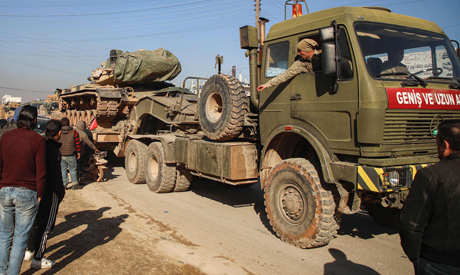
A Turkish military convoy of tanks and armoured vehicles passes through the Syrian town of Dana, in Idlib
(photo: AFP)
Two or more years ago, Ankara proclaimed that it would never allow the predominantly Kurdish People’s Protection Units (YPG) in Syria, which it lumps together with the Kurdistan Workers’ Party (PKK), to sow disruption and violence from any spot in Syria. Acting on this vow, it waged three military incursions to which it could not have given more cynically conceived codenames: Euphrates Shield, Olive Branch and Fountain of Peace. There has been no let up on the jingoism. Only last week President Erdogan reiterated a threat he had made innumerable times before: “Turkey will not remain a mere spectator if the situation in Idlib is not resolved immediately. We will do what is necessary when someone is threatening our soil. We will have no choice but to resort to the same path again if the situation in Idlib is not returned to normal quickly.” “We will not refrain from doing what is necessary, including using military force.”
Yet, Turkey’s use of military force intermittently and in three full-scale operations (or “madcap escapades” as Turkish opposition parties have described them) failed to achieve their purported aims and dragged Turkey deeper and deeper into the Syrian quagmire. Despite the enormous resources Ankara has invested in its Syrian interventions, the last thing they brought to Syria is stability and peace, despite the codenames. A case in point is Ankara’s failure to impose administrative control over Ras Al-Ain and Tel Abyad through the creation of municipal councils. The main reason for this failure is the infighting among the Turkish-backed militias which are constantly at each other’s throats, exchanging charges of heresy while proving their valour through killing and plunder. According to local reports, some towns and villages have not had a moment’s peace since they fell under the control of the Turkish army and its jihadist allies.
A recent manifestation of the fissures in the ranks of the Turkish-backed forces is the “From Idlib to Berlin” campaign launched by Syrian activists in response to the warfare in that province. The organisers called for a demonstration in a camp located near the Syrian border with Turkey, opposite to the Turkish town of Reyhanli. The call, broadcast over social networking sites, said that the residents of Idlib, who were being forced from their homes due to the escalating violence in Idlib, had only two alternatives left; either being killed by Al-Assad’s bombs and chemical weapons or seeking safety in Europe. But given the location, it sent a clear message to Turkey, in its capacity as a “guarantor” under the Astana agreements. It also carried an implicit charge of “treason” against Erdogan because of his bartering games with Russia playing mounting violence in Libya against mounting violence in Syria.
Whether alarmed at the prospect of a fresh influx of refugees or dismayed by the routing of the Syrian militias, Erdogan has threatened a fourth military operation in Syria if the situation in Idlib is not returned to “normal”. On his way back from his African tour in January, Erdogan told his reporters that his government told Moscow that Ankara’s patience was running out with respect to the situation in Idlib and that if Russia returned to the Sochi and Astana agreements Turkey would continue to abide by them as well. He then sent in reinforcements that included dozens of troops and hundreds of elements from the so-called “national army” into the western outskirts of Aleppo and set up a new control point north of the critical Saraqib district to replace one at Sawamie to the south. But does this mean that Erdogan will proceed to throw down the gauntlet to the Russians?
Moscow has insisted that it has fully adhered to its obligations in Idlib and it pointedly added that it was deeply concerned by the attacks waged by the Turkish-backed militias against Syrian government forces and the Russian Hmeimim Airbase. Then, in the course of the fierce bombardement in Idlib, Russian fighter planes targeted “terrorist militias” in western Aleppo province on Sunday, just as a Turkish military company was passing.
Meanwhile, Al-Assad’s forces have been making further advances against rebel forces in Idlib and Aleppo. When regime forces captured the strategic city of Maarat Al-Numan from jihadist militias last week, opposition newspapers in Turkey that had warned against the folly of meddling in Syria years ago could barely restrain themselves from saying “I told you so”. Fragile ceasefire agreements crumbled in areas under control of the Turkish-backed Hayat Tahrir Al-Sham (formerly Al-Nusra Front). Damascus now appears within reach of achieving its declared aim of retaking Idlib. If it does, it will have regained control over nearly the whole of Syrian territory, which will come as yet another painful setback to the Turkish regime’s policies.
Will Erdogan try to forestall this through a fourth military operation? Observers doubt it. Some believe it next to impossible in light of the regional and international contexts. Others warn that would be even madder than the Peace Spring invasion which elicited a universal outcry, rallied international sympathy behind the very people it targeted, and made Turkey more isolated than ever.
*A version of this article appears in print in the 6 February, 2020 edition of Al-Ahram Weekly.
Short link: